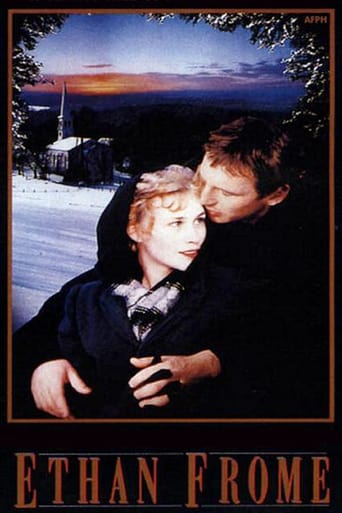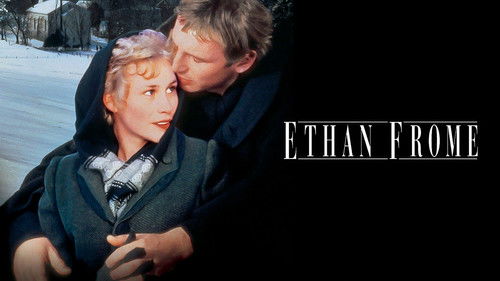rsubber
Based on the novel, Ethan Frome (1911), by Edith Wharton.I watched the movie, then I read the book, then I watched the movie again (and again), it's easier than reading the book again, but I'm going to do that too. For my taste, the book and the movie are interchangeable. Knowing the ending doesn't reduce the dreadful intensity of this story that gets ever more sad from beginning to end. The love story breaks through the arid shell of real life—oh, so briefly…Ethan (Neeson) wants more, Mattie (Arquette) wants more, the viewer wants more… Every other character in the story seems to, well, not "want" less but be all too righteously satisfied with less. Except for a brief whirl of a dance scene, there are no smiles on the faces of any of the other characters who live dried up lives, and disdain the spark of love and life in Ethan and Mattie. Doubtless, the town folk see a pitiless moral lesson in the damaged life of Ethan Frome and the love he must keep stuffed inside him. I see a man and a woman who share forbidden love, but don't know what to do about it, and grotesquely fail to snuff it out. Read more on my blog: Barley Literate
sickeld160
John Madden's cinematic interpretation of Edith Wharton's Ethan Frome falls short of doing justice to a great literary piece. While the story is maintained the elements that give the novella its soul are skewered and all in all lost in the film. Madden fails to convey the innocence, and overall tragedy of Ethan and Mattie's relationship instead transforming it into a morality tale. The mark is missed and the point lost in added details and poor dialog. Zeena (Zenobia) in the book is almost completely the antagonist, the books least sympathetic figure, where in the movie she can be almost pitied though it's a stretch you kind of feel bad for this sick woman who is being cheated on. The book more accurately describes Zeena's tyrannical control of the house and of Ethan. The movie just ticked me off. The addition of the fox was pointless, as well as the scene with Mattie trying to kill herself. It was just poorly interpreted and done. Film mistakes: Ethan's elusiveness in the church dance scene, interactions with Denis Eady, addition of love scene, fox scene, store scene, saying his plans allowed, lack of displays of Ethan's inner emotions and thoughts, introduction of the priest instead of nameless engineer, let on to much that Zeena knows about the growing relationship where in novel reader never knows what Zeena is thinking or aware of. Just too many flaws and poor directing decisions.
mikeeoo
I must say outright that this book is one of the best Edith Wharton books you could possibly read, so I was a little dubious going into this film.I was pleasantly surprised though by the detail and care that the director and actors put into it, although I would quibble with one point- I found that rather than the Whartonian 'repression', the performers seemed to be awkwardly stumbling with their emotions- it's a fine line to be sure.Liam Neeson does a wonderful job in this film, beautifully nuanced performance, and Joan Allen (as always) just about walks away with the film.Absolutely worth a viewing, but try the book first, it's superb.
rodw
The photography is one of the best aspects of the film. The depressing snow and freezing temperature really come across well. The acting is good. In particular, Joan Allen shines as the sickly wife and Liam Neeson is very sympathetic as Ethan. The essential weaknesses of plot derive more from the novella than the director; the theme is not that relevant for modern audiences and some of the criticism levelled against it is undeserved. The plot is faithful to the original although one character is changed from an engineer to a clergyman. The poverty of the town is very well illustrated and gives an alternative view to some Victorian set films.




